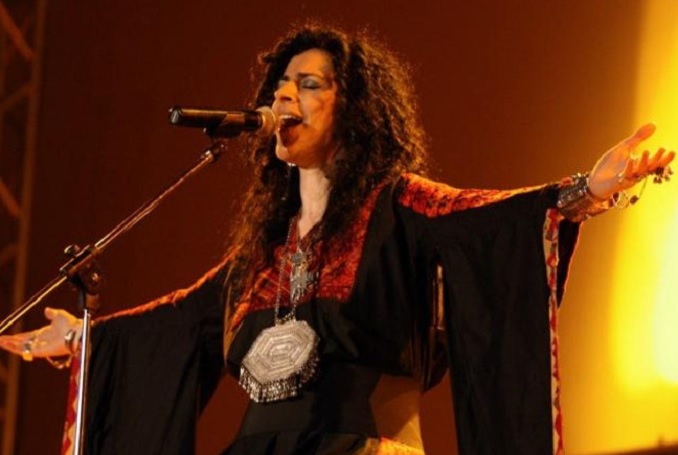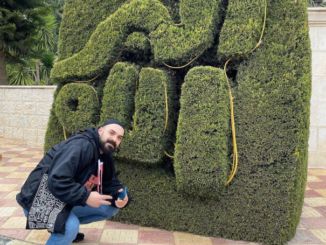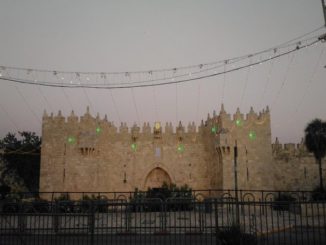
By Louis Brehony
The body of Palestinian vocalist and songwriter Rim Banna was laid to rest in her home city of Nazareth on March 24, 2018, after a struggle with cancer that never reduced her determination to sing and resist. She will be remembered for her songs for children, her dedication to Palestinian freedom, and for her refusal to be categorized as a second class citizen of the state of Israel. Her music told the stories of the beauty of life despite times of oppression and urged the occupied, exiled and imprisoned to maintain a heritage of resistance.
Born in 1966, into a working class Christian family in Nazareth, Rim received training in the Soviet Union and rose to prominence in Palestine in the era of the first intifada, recording her first album Jafra while she was still a teen. Her cassettes were produced on low budgets and, like Shafiq Kabha and other radical Palestinian voices, she operated outside of the Zionist cultural mainstream, refusing to be co-opted and instead finding popularity among the masses dedicated to the cause of liberation. She wrote or co-wrote her own music, sometimes arranged around the works of national poets but always with an ear for traditional melody. Composer and founder of the Sabreen band, Said Murad, remembers meeting her during this early period:
“We had a performance in Nazareth at the time and her mom was very proud that Rim had just came back from Russia and that she had a beautiful voice. She told me Rim had chosen the same song that Sabreen was singing, a poem by Sameh Al Qasem titled Ahki lil A’alam, meaning “I tell the world”, a nationalist poem. Rim sang it to a different tune of course but that was my first meeting with her and her music.”
Rim was a one-off, combining a simple style of folklore-inspired melody with pop elements and writing about lives under occupation. Every song told a story, and many of them painfully real. The song Fares Odeh commemorates a youth shot and killed while throwing stones at IDF forces invading Gaza at the outset of the Second Intifada in 2015:
Butterflies will carry you to the surface of a cloud
A gazelle will plant you in the roots of a sycamore
The odour of bread and milk will take you
As a martyr to your mother’s lap
ستحملك الفراشات إلى ظهر غيمة
ستجري بك الغزالة إلى جوف جميزة
ستحملك رائحة الخبز والحليب
شهيدا إلى حضن أمك
If she often sang of tragedy, she also embraced sumud (steadfastness) and promoted pride in being Palestinian, responding to Zionist narratives of repression and erasure with a message of the life and vitality of everyday experience. In Halalala Laya, Rim sings as a young girl, complaining to her mother that she wants to get married. In Teeri hada Ya wazi, she sings of a bird flying sadly over the land, naming Safad, Deir Yassin, Yafa and Haifa among the cities, towns and villages. For her, the land of Palestine stretched from the river to the sea and its cultural heritage could not so easily be divided politically from its people.
Nor could the people be easily divided from each other. To Gazan oud player Reem Anbar:
“She sang for the country, for the land, life, peace and love. I see her as one of our strongest women and as a unifying musician, challenging our social distinctions of Muslim and Christian. She continued to sing throughout her years of cancer, and although her body was weak, she stayed strong and carried on making beautiful music. Even as she knew she was approaching death, she continued to sing of life.”
Speaking to activist Shadi Daana, Rim declared: “I am resisting two cancers: the occupation and the one inside my body.” Her position as an “Israeli citizen”, or a ’48 Palestinian living in al-dakhil, “inside” of the green line of the Zionist state was both a source of frustration and a catalyst to rejecting this designation. By singing, she could cut across the fragmentation of her people through a musical connection to folk heritage and offer solidarity by singing the stories of those on the receiving end of Israeli brutality. According to Saied Silbak, an oud player and composer from Shefa’amr, Rim was an inspiration to other ’48 Palestinians:
“Rim was a gigantic part of my childhood and for most of my generation. She still is and I believe she will be for years and years to come. In one of her children song’s she sang, “we have a clock hung on our wall…”. In her life she hovered courageously, above clocks and time and will continue to be, even though she is no longer physically with us.”
Rim’s dedication to the next generations resulted in whole albums of nursery rhymes and traditional children’s songs, with many Palestinian youths remembering her songs. Jerusalem-based artist Farah Ghneim recalls:
“I grew up with Rim’s songs, played to us in kindergarten. Her children’s songs were infused with magic, dream, and laughter. She sung about birds, the moon, flowers and animals. A story was told and a painting was drawn in a child’s mind, and we would dance for hours to her songs. Her voice and art will live with me forever.”
In an unpublished interview in 2005, Rim told me of her mission to “keep folk texts from being lost and helping the younger generation to be aware of their folklore”. She described the situation for musicians in the Second Intifada:
“The Intifada has created a special atmosphere for artists, which inspires many of them in their music and songs. The intifada turned us into fighters more than artists… Many concerts have been cancelled. It is very hard to pass the checkpoints carrying musical instruments.”
“For me, my music and song has become very political. I’m fighting through the music and trying to leave a big influence in the heart of the European audience, to move something in their minds and feelings, I want them to be more active in supporting the Palestinian people because people can change the political will of their governments.”
As in her life, responses to Rim’s legacy include those designed to erase the consciousness and solidarity of ’48 Palestinians. The Times of Israel writes of the death of a “leading Arab Israeli singer”, while in its own obituary, al-Jazeera names Nazareth as a part of Israel. The crowd at Rim Banna’s funeral in Nazareth told a different story, singing the words to Mawtini, the unofficial national anthem of Palestine:
Will I see you in your eminence?
Reaching to the stars, reaching to the stars
My homeland, my homelandهـــــلْ أراكْ فـي عُـــلاكْ
تبـلُـغُ السِّـمَـاكْ تبـلـغُ السِّـمَاك
مَــوطِــنِــي مَــوطِــنِــي
– Louis Brehony contributed this article to PalestineChronicle.com.







